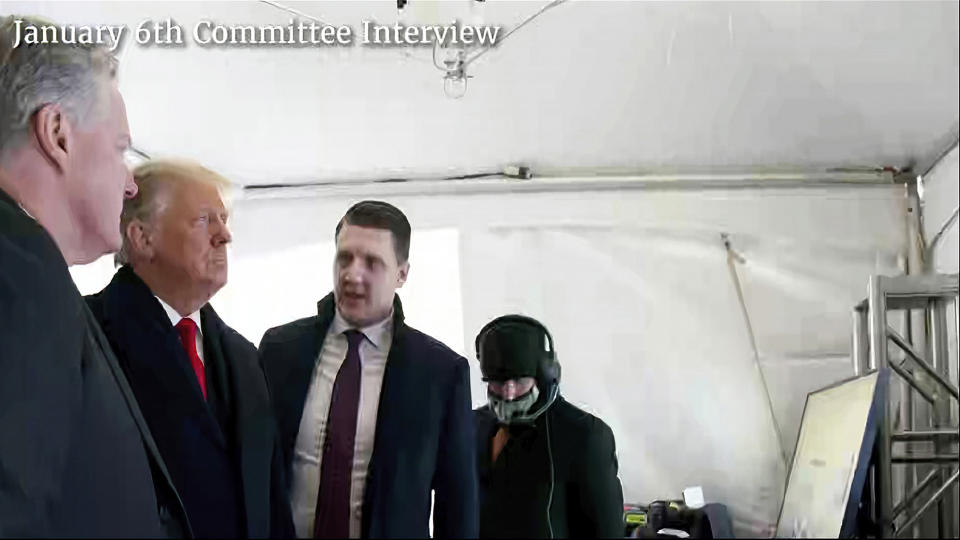Trump grand jury hears testimony from aide who was with him on Jan. 6
- Oops!Something went wrong.Please try again later.
- Oops!Something went wrong.Please try again later.
WASHINGTON — A federal grand jury deciding whether to indict former President Donald Trump over his efforts to overturn the 2020 election met Thursday and heard testimony from an aide who was with Trump for much of the day on Jan. 6, 2021.
William Russell, a former White House aide who now works for Trump's presidential campaign, was scheduled to testify before the grand jury convened by special counsel Jack Smith. Russell has previously testified before the grand jury, which is investigating the Jan. 6 riot and efforts to "interfere with the lawful transfer of power following the 2020 presidential election."
Trump — who said this week that he received a target letter giving him until Thursday to testify before the grand jury — is not expected to appear at the federal courthouse in Washington.
Trump’s target letter mentioned three specific federal statutes related to deprivation of rights, conspiracy to defraud the U.S. and tampering with a witness, said two attorneys with direct knowledge of the document.

Stanley Woodward, a lawyer representing Russell, was spotted near where the grand jury is meeting Thursday and later told a judge in an unrelated trial that federal prosecutors were asking his client about issues that concern executive privilege.
Woodward was late to an afternoon hearing for a Jan. 6 defendant he represents, former Trump appointee Federico Klein, prompting U.S. District Judge Trevor McFadden to ask him to explain the delay. Woodward responded that he had to return to the grand jury room because “I could not leave my client in the grand jury when he was being asked questions that specially involved executive privilege.”
McFadden said the government had not acted as he required and summoned prosecutors from the grand jury to his courtroom. Thomas Windom, a prosecutor from Smith’s office, and three colleagues arrived shortly thereafter. McFadden, Windom and Woodward spoke at the bench for roughly five minutes. Their conversation could not be overheard, and Windom and his colleagues left the courtroom after.
The grand jury has already heard testimony from dozens of witnesses in the wide-ranging investigation.
Smith’s team appears to be focusing on the so-called fake electors scheme that involved false slates of electors — Trump allies who wrongly asserted that he had won battleground states where President Joe Biden was victorious. Michigan's Democratic attorney general announced Tuesday that she had charged 16 people with being involved in the fake electors scheme in the state, including eight felony counts each, including forgery.
Smith also subpoenaed security video from a polling site in Georgia, suggesting an interest in some of the bogus conspiracy theories that Trump and his team spread about Black poll workers in a state Biden won.
Former New York City Police Commissioner Bernard Kerik, who worked with Rudy Giuliani’s legal team after the 2020 election, will meet with the special counsel's office in mid-August on a voluntary basis to answer questions about Jan. 6, according to his lawyer, Tim Parlatore.
Smith, who delivered a grand jury indictment against Trump last month in connection with his handling of classified documents, was appointed in November, shortly after Trump announced his 2024 presidential bid.
This article was originally published on NBCNews.com

